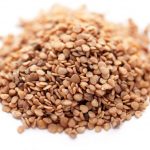
Fenugreek – sources, health benefits, nutrients, uses and constituents at NaturalPedia.com
Wednesday, July 12, 2017 by Earl Garcia
http://www.naturalnewsherbs.com/2017-07-12-fenugreek-sources-health-benefits-nutrients-uses-and-constituents-at-naturalpedia-com.html

Fenugreek is a noteworthy herb that has been used in alternative and traditional Chinese medicine to address a host of diseases. The herb’s seeds are mostly used in the treatment of various conditions. Fenugreek is native to the sub-Himalayan plains, and are widely cultivated in different parts of the world including Southern and Mediterranean Europe, Middle-East Asia, and northern African regions.

List of known nutrients
Fenugreek is greatly valued for its high nutrient content and many health benefits. The list of essential vitamins and minerals found in fenugreek include:
- Calcium
- Copper
- Folates
- Iron
- Isoflavones
- Magnesium
- Manganese
- Niacin
- Phosphorus
- Potassium
- Pyridoxine
- Riboflavin
- Selenium
- Sodium
- Thiamin
- Vitamin A
- Vitamin C
- Zinc
Medicinal uses for fenugreek
Fenugreek is best known for its beneficial effects on the female reproductive system. The superfood is found to ease the menstrual process and relieve its symptoms. The herb is classified as a emmenagogue. This means that fenugreek can open up obstructed menses to help the process go smoothly and comfortably. Likewise, certain compounds found in fenugreek such as diosgenin and estrogenic isoflavones are known to ease symptoms of menopause including mood swings, depression, cramps and abnormal hunger pangs.
Aside from this, the superfood is touted to reduce labor pain and ease child birth by inducing uterine contractions. Fenugreek is also notably beneficial for lactating mothers. The superfood is packed with the compound diosgenin, which bolsters milk production. On the other hand, the rich magnesium and vitamin content in fenugreek helps improve milk quality.
The superfood is also highly valued for its positive cardiovascular effects. Fenugreek is an excellent source of steroidal saponins that prevent cholesterol and triglyceride absorption. As a result, the superfood helps lower the body’s cholesterol levels and reduce the odds of various cardiovascular conditions such as atherosclerosis, heart attacks and strokes. Likewise, the beneficial herb contains high levels of galactomannan, a natural soluble fiber that helps slash the risk of heart conditions.
The same soluble fiber is found to slow down the body’s sugar absorption, making fenugreek an effective superfood against diabetes onset. The herb also contains a certain amino acid the promotes insulin production. Fenugreek induces slow insulin release, rather than large-volume releases. This in turn prevents sudden peaks and plunges in blood sugar levels. Aside from this, fenugreek is found to address various kidney conditions.
In addition, fenugreek is touted for its anti-carcinogenic potential. Diosgenin, a type of steroid found in fenugreek is known to specifically fend off colon cancer onset. Likewise, various non-starch polysaccharides — such as saponins, hemicellulose, mucilage, tannin and pectin — in fenugreek prevent bile salt from being reabsorbed in the colon. Aside from this, the rich fiber and antioxidant content in fenugreek are known to aid digestion and relieve digestive issues such as stomach pain and constipation. On the other hand, the mucilage in fenugreek coats the stomach and intestinal linings and soothe irritated gastrointestinal tissues, thus relieving acid reflux or heartburn. The high fiber content in fenugreek also aids in weight loss.
Furthermore, fenugreek is known to address a plethora of skin diseases and promote hair growth.
Body systems supported by fenugreek
Fenugreek is particularly beneficial to the female reproductive system. Likewise, the superfood supports the digestive, cardiovascular and urinary systems. The herb also promotes healthy skin and hair.
Ways to use fenugreek
The slightly sweet and nutty flavor of fenugreek seeds have made the herb a staple in many Indian and Asian recipes. It is an ideal addition to various meat, seafood and poultry dishes. Likewise, the superfood can be incorporated in vegetable dishes, salads and soups. Allrecipes.com has compiled many interesting fenugreek recipes across the web.
Where to learn more
- Fenugreek: nature’s aphrodisiac
- Flax, Fenugreek and Fennel strongly protect lungs and large intestine
- What Is Fenugreek Good For? Here Are 7 Facts About It!
- The Nourishing and Healing Benefits of Fenugreek Herb
- Good Food Choices for Diabetics: Try Soups Made with Beans and Fenugreek
Summary
Fenugreek prevents menstrual issues, colon cancer, diabetes, and cardiovascular diseases.
Fenugreek staves off digestive issues and various kidney conditions.
Fenugreek benefits the digestive, cardiovascular, and urinary systems.
Fenugreeksupports the female reproductive system, the hair, and the skin
Sources include:
Tagged Under: Tags: fenugreek





